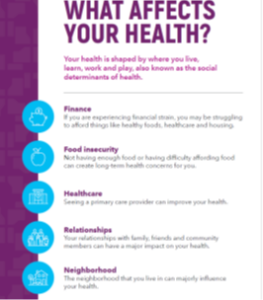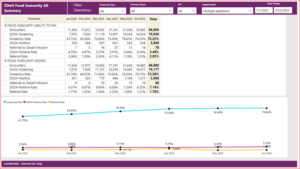Social Determinants of Health
Social Determinants of Health (SDoH) play a crucial role in shaping individuals’ well-being and health outcomes. According to Marmot, Friel, Bell, Houweling, and Taylor (2008), these determinants encompass the conditions in which people are born, grow, live, work, and age, and include factors such as finances, food insecurity, primary healthcare, social support networks, and neighborhoods. They significantly influence access to healthcare, health behaviors, and overall health status. For instance, a study by Adler and Stewart (2010) demonstrated the impact of income inequality on health disparities, highlighting how social and economic inequities can lead to unequal health outcomes. Understanding and addressing these social determinants are essential for achieving health equity and improving population health (Marmot et al., 2008; Adler & Stewart, 2010).
The Centers for Medicare & Medicaid Services (CMS) issued the calendar year (CY) 2024 Medicare Physician Fee Schedule (PFS) proposed rule to announce rate updates, advance health equity, and expand access to critical medical services. The CMS priorities in health equity are – Priority 1: Expand the Collection, Reporting, and Analysis of Standardized Data. Priority 2: Assess Causes of Disparities Within CMS Programs, and Address Inequities in Policies and Operations to Close Gaps, Priority 3: Build the Capacity of Health Care Organizations and the Workforce to Reduce Health and Health Care Disparities, Priority 4: Advance Language Access, Health Literacy, and the Provision of Culturally Tailored Services, and Priority 5: Increase All Forms of Accessibility to Health Care Services and Coverage
HonorHealth is working to address the SDoH issues that patients face. We conduct SDoH screenings and provide resources to address their needs. Right now, screening for SDoH issues is being conducted in 25 primary care clinics, with the goal of having all clinics participating by the end of 2023.
We are working to improve our referral process and we have begun the implementation process of a closed-loop referral system called UniteUs that will be integrated into EPIC. This will allow the provider to issue a referral in EPIC. The referral can be tracked and managed from within EPIC.
References:
Adler, N. E., & Stewart, J. (2010). Health disparities across the lifespan: Meaning, methods, and mechanisms. Annals of the New York Academy of Sciences, 1186(1), 5-23.
Marmot, M., Friel, S., Bell, R., Houweling, T. A., & Taylor, S. (2008). Closing the gap in a generation: Health equity through action on the social determinants of health. The Lancet, 372(9650), 1661-1669


HonorHealth’s Key Strategic Indicator Q2 update for SDoH – 2023
The HonorHealth Medical Group (HHMG) exceeded its goal of screening for food insecurity in the active locations where 72.35% of patients were screened once annually for Q2 2023. The food insecurity project will expand to nearly all primary care locations by the end of Q4 2023. Food insecurity along with all Social of Determinants of Health (SDoH) active for all department locations via MyChart, and eCheckin but emergency food bags are no longer provided but have been replaced with an educational brochure for healthy food resources within the community.

HonorHealth’s Key Strategic Indicator for SDoH – 2024
Ensure BEST CARE is delivered to our patients by developing and implementing programs to eliminate healthcare-associated harm, reduce clinical variation, be a high-reliability health system, and make care more affordable.
KSI 2024 Planning includes the hospital SDoH program and incorporating additional service lines beyond primary care by promoting health equity. Aligning Medicare health equity metrics for value-based payment programs. Develop data collection for health equity including Race, Ethnicity, and Language (REaL) and Sexual Orientation and Gender Identity (SOGI).
Student Scholars
Academic affairs partners with learners interested in scholarly activity and pre-health profession(s) which include research scholars from volunteer services, Arizona State University Barrett Honors, and medical students with affiliated institutions with HonorHealth. Five new Student Scholars from the ASU Barrett Honors College have joined us for this academic year.
Diversity, Equity, & Inclusion (DEI)
Academic Affairs – Health Equity is actively collaborating with Evener Scott, the new Diversity, Equity, Inclusion, and Belonging Director. This includes the launch of the FIRST (Fostering Indigenous Representation through Service and Tradition) Peoples People Resource Group (PRG) and Honor in Pride (HIP) PRG. Both PRGs will offer lived-experience to support the development of the curriculum for culturally sensitive care being developed by the Internal Medicine Residency Program.
We have launched the Addiction Medicine consult service with Case Management in collaboration with Community Bridges, Inc which includes the fellowship program Expanded data to be captured which includes site/hospital, payer, zip code, visit type, ethnicity, and sex.
Additional Information
- HonorHealth Library Services, educational resources for SDoH
- SDoH Social Determinants of Health (sharepoint.com)
